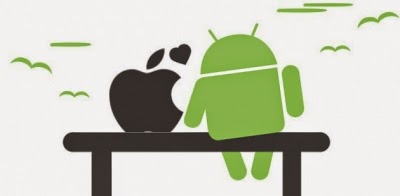People are fascinated with the iPhone. They buy iPhone at a huge price but sometime they ignore the Android phone which is as good if not better than the iPhone. iOS and Android they both have different style and different platforms. They both are good at their service. But as we know there are many apps which are not supported by iPhone (iOS). When a person use an iPhone after using an Android phone, they faces many problems because of the huge difference.
-
Security
The downside of anyone being able to build Android applications is that some of them, perhaps as many as one in five Android applications, have security holes in this at this time. Not good.
While any system can be broken, at this time the iPhone’s tightly controlled applications seem to be the safest bet for people who want a secure phone. Sad isn’t it? Just as we’re finally leaving PC and Windows’ perpetually broken security model, we’re going to be facing a new generation of security problems built around the vulnerabilities that comes with mobile computing.
-
User Control
If you like how the iPhone and iOS handles things, life is great. And, to be perfectly fair, Apple has killer design engineers whose job is to make sure you’re going to love the interface and how it all works together. But, say, you’d like more control over how widgets appear or what the interface looks like, in that case, Android is your better choice.
-
Battery Life
Here I see a situation where you get to pick your poison. Generally speaking, iPhones have had better battery life. That’s the good news. The bad news is that you can’t replace the battery yourself. I hate that.
On the flip side, Android-powered hardware seems to average a couple of hours less time per charge for me. And, yes I know all about battery training and optimization. When it comes to battery life, I see it as a coin-flip between the two.

-
Operating System
The iPhone runs the iOS operating system, or OS. Other smartphone operating systems include Android, Blackberry, Symbian and Windows. The iOS runs solely on the iPhone, while other operating systems, such as Android, are available on multiple brands of cellphones. The iOS includes multitasking, folders and tethering that allows other devices to share the phone’s Internet connection, but similar features are available with other mobile operating systems as well. One difference is that although iOS cant be “hacked,” it doesn’t allow the same level of customization and programming as the systems that run other smartphones.
-
Compatibility
The first four versions of the iPhone must be synchronized with a personal computer and iTunes. An iPhone user needs a Mac or a Windows-based computer and an iTunes account. This sets it apart from the majority of smartphones on the market, since other phones don’t require a computer to set up and use the phone. The release of iOS 5 changes this requirement, allowing those without computers to own the iPhone.
-
Applications
The iPhone connects to Apple’s App store, which offers thousands of applications for use on the iPhone. Programmers must use a special set of developer tools to make the apps, and many have at least a small fee for use. Other operating systems don’t require the use of propriety software for application development. Despite this requirement, and the stipulation that Apple approve the program, as of the time of publication the iPhone has the widest selection of applications available and is the only phone with advanced video editing capabilities.
-
Hardware
The iPhone has different hardware from other smartphones. The reported battery life is one of the longest of any smartphone on the market. The iPhone’s screen size is smaller than most other smartphones, but it has an extremely high pixel density, giving it one of the sharpest resolutions available. The iPhone incorporates built-in storage with different hard-drive sizes available, or even cloud drives at extra cost options but it doesn’t incorporate a memory card slot for additional storage space. A slot for external memory is a common feature on other smartphones.
-
Cost
Although part of the iPhone’s cost is subsidized when a service contract is signed, the iPhone is more expensive than other smartphones on the market. Part of this is because the iPhone was the first smartphone released and other companies decided to compete with the device based on price. However, most Apple products have a higher retail cost than similar products released from other manufacturers. In addition to the cost to purchase the device, smartphone users pay a premium for data service. This increases the monthly cost of operating the phone, but is the only way to take advantage of many of the features.
Here is pretty much the differences between these two systems. Now you are the one who’ll decide which one you buy.
Happy buying!!





































